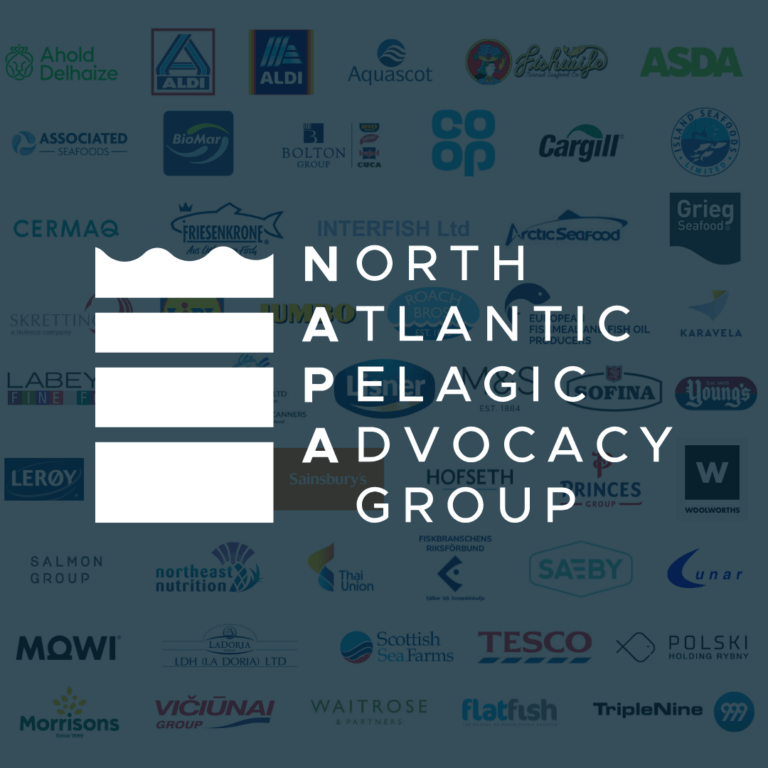Following a landmark meeting of NAPA partners on 5th December 2024, at which we welcomed catching sector representatives and Coastal States’ negotiators, NAPA (the North Atlantic Pelagic Advocacy group), wants to reinforce a message central to its mission; there is no space for ambiguity when it comes to the sustainable management and certification of pelagic fisheries. Certified products hinge on responsible, long-term management of stocks and they are the only way to clearly evidence ethical procurement to consumers. Either fisheries are certified as sustainable, and we source from them, or they are not, and we must reconsider. While we have consistently made our position plain, political stalemate continues to threaten sustainable, long-term management of pelagics – and therefore makes certification impossible at this time.
Northeast Atlantic mackerel, blue whiting and Atlanto-Scandian herring once held MSC certification, and can again, but they’re currently unable to fulfil the governance criteria of the certification process. Why? Because of the lack of a comprehensive, science-based sharing agreement – meaning the governance of the fisheries creates material risk to their long-term sustainability. This is a barrier that simply can’t be overcome by any actors other than the Coastal States themselves. There is no remedy to this, other than unanimous political agreement.
The science for these stocks is clear: there is good reason to be concerned for their long-term health. Overfishing is occurring on all three species, due to Coastal States’ inability to come to a comprehensive sharing agreement between parties – effectively ignoring the scientific advice that they all claim to endorse. This will, inevitably, lead to stock decline. As a result, our ability to source from some of the most data-rich, well-resourced fisheries in the world hangs in the balance.
We remain concerned that the finer details of stock health may well be a distraction from the big picture. It’s easy to point to the current ‘boom’ in blue whiting (which history tells us will become a bust soon enough), or a strong incoming year-class in herring, and feel reassured that the consequences of political inaction on pelagics can be postponed. They can’t.
We want to be completely clear. The supply chain will reconsider sourcing products from fisheries if they do not have a robust and credible management regime in place that is capable of delivering stock sustainability. At the moment, all three stocks are within NAPA Fishery Improvement Projects (FIPs) – a vehicle designed to give the market a voice and drive political agreement; offering Coastal States a chance to avoid the cliff-edge of purchasing decisions that is looming. While both FIPs have been extended up to 2026, there is no further extension beyond that point.
NAPA is looking to all nations to demonstrate their commitment to long term sustainability. While comprehensive sharing agreements are complex and take time, short term actions to protect stocks, such as limiting fishing in international waters, are not only within the reach of everyone, but essential to pave the way for long-term success. NAPA expects to see meaningful improvements by all: there is no excuse for inaction.
Seafood buyers are already considering their purchasing decisions for 2026 and beyond, and remain resolute in their commitment to only source from fisheries that meet the required sustainability threshold.
NAPA, as a collective, remains eager to support Coastal States negotiators and any other actors working to secure a solution for northeast Atlantic pelagics management, with research, discussion, proposals and any tools at our disposal.
View the official press release here.

Date of issue: 31 January 2023 Talks to secure a quota sharing arrangement for Northeast...
Read More >
The North Atlantic Pelagic Advocacy Group has been shortlisted for The Sustainability Award in the...
Read More >
Date of issue: 7 October 2021 The North Atlantic Pelagic Advocacy Group (NAPA) – a...
Read More >